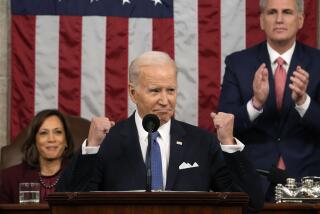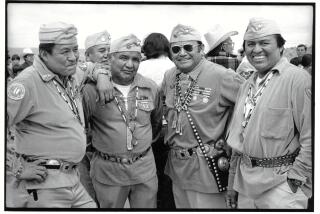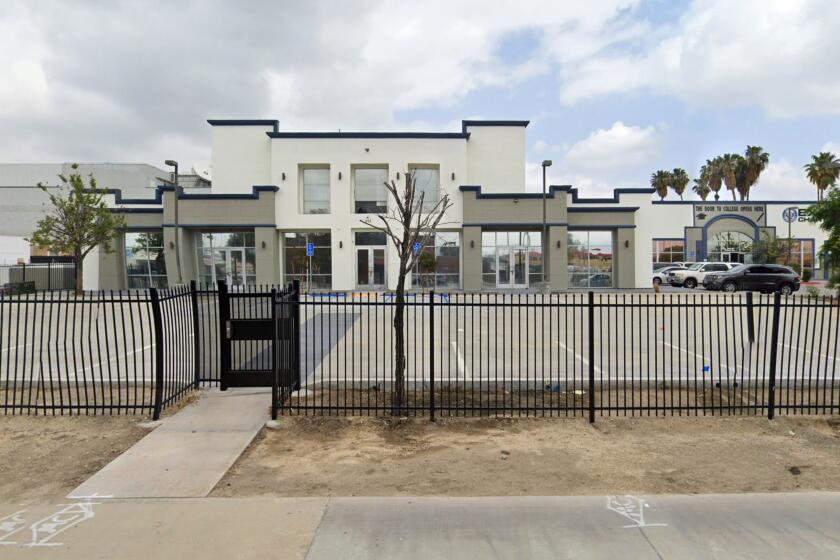Wartime linguistics
NOT SINCE THE frigid days of the Cold War have so many people parsed the lexicon of a world leader. Americans tuned in Wednesday night to hear the president’s plan for a “new way forward” in Iraq. We also tuned in to be convinced and reassured that President Bush was the right man to execute that plan.
The speech was a clear attempt to draw a distinct line between the past and the future. The president addressed head-on the most common attacks on him and his administration, countering “inflexible,” “unrealistic” and “incompetent” — three words pollsters like myself have heard from an angry electorate for more than a year — with “adjust” and “change,” “scrutiny,” “responsibility” and, again and again, “our new strategy.” Speaking from the White House library, a different setting befitting a different strategy, the president attempted to make the case that things in Iraq were going to be different from now on.
The problem is, for most Americans it is too little and too late.
In the president’s own words:
“Our past efforts to secure Baghdad failed . “
True enough, but Americans had already figured that out. Now they are asking themselves why it took him so long. The rising troop death toll, the increasingly cruel and inhumane violence by Iraqis against Iraqis and the steady stream of graphic videos belie this attempt at linguistic minimization.
“There were not enough Iraqi and American troops . And there were too many restrictions on the troops we did have.”
These two sentences, while seemingly straightforward, may well become the most important of the entire speech. Americans have been told repeatedly that the commanders and troops would be given everything they need to win the war. Apparently, even the president now admits that wasn’t the case.
“We will give our commanders and civilians greater flexibility to spend funds for economic assistance.”
Given the unemployment in our own Rust Belt, Bush’s jobs program for Iraq forces deficit-conscious Americans to choose between U.S. security and Iraqi security, between American economic development and Iraqi economic development. For most Americans, that choice is a no-brainer.“We will double the number of provincial reconstruction teams to help local Iraqi communities pursue reconciliation.”
Reconciliation? It surely is an admirable long-term goal, but before you can break bread together, you first have to stop killing each other. For two years, we’ve been treated to horrific videos of mass sectarian violence. The picture conjured by “reconciliation” doesn’t match anything that is in our visual databank.“To empower local leaders, Iraqis plan to hold provincial elections . “
We all remember with pride the purple fingers defiantly waving in the air last year. But if you asked Americans (and probably Iraqis as well) which is a higher priority, they’d wish for peace and calm ahead of another trip to the ballot box.
Not all of the speech was miscast. There were several examples of credibility-building passages and real-life references that will be well received by the American masses.
“A democratic Iraq will not be perfect. But it will be a country that fights terrorists instead of harboring them.”
This is the most tangible reference to a genuine benefit that Americans can appreciate and share, regardless of ideological persuasion. It is a fact that we haven’t had a successful terrorist attack on American soil since 9/11. Although many Democrats would deny him any credit, the president does still earn positive marks for the aggressive prosecution of the war on terror.
“If we increase our support at this crucial moment we can hasten the day our troops begin coming home.” Finally, a nod to an end to the conflict. What has been missing from the Bush rhetoric for more than a year is the proverbial light at the end of the tunnel — a chance for Americans to put the war behind them and focus on a more hopeful future.
If the president had his verbal ups and downs, the Democrats’ response wasn’t brilliant rhetoric either. They should probably consider themselves fortunate that the networks didn’t want to delay or preempt even a minute of fare such as “Deal or No Deal.” Their stringent rhetoric and unwillingness to compromise highlights their continued inability to put forward a comprehensive, credible alternative.
House Speaker Nancy Pelosi’s spokesperson told USA Today that her boss would subject Bush’s proposal to “harsh scrutiny.” Words like “examination” or “accountability” would have been a more objective and less political approach for a party desperate to demonstrate that it isn’t too partisan or too negative.
Similarly, “We’re not going to baby-sit a civil war” — Sen. Barack Obama’s sound bite — ignores widespread American concern that a civil war today could spin into a regional war tomorrow, with worldwide consequences. The image of “baby-sitting” lacks the gravitas that a conflict that has taken thousands of American lives, and tens of thousands of Iraqi lives, deserves.
In times of war, the American people have the right to expect a president who is straight with them linguistically, whether he’s delivering good news or bad news, and an opposition party that uses words to unite and explain rather than divide and attack. Too bad we haven’t had enough of either.
More to Read
Start your day right
Sign up for Essential California for news, features and recommendations from the L.A. Times and beyond in your inbox six days a week.
You may occasionally receive promotional content from the Los Angeles Times.






